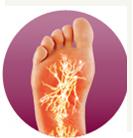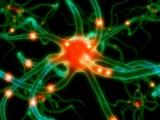Natural compounds in the body may relieve pain for millions of diabetics
 If the bed sheets make your feet burn or just standing the first thing in the morning causes a prickly tingling sensation in the soles of your feet you are experiencing what is called peripheral neuropathy, which affects the nerves that serve the farthest reaches of the body, such as the feet, legs and hands. If you have diabetes, it is referred to as diabetic nerve damage, or diabetic neuropathy.
If the bed sheets make your feet burn or just standing the first thing in the morning causes a prickly tingling sensation in the soles of your feet you are experiencing what is called peripheral neuropathy, which affects the nerves that serve the farthest reaches of the body, such as the feet, legs and hands. If you have diabetes, it is referred to as diabetic nerve damage, or diabetic neuropathy.
In an interesting study in the Proceedings of the National Academy of Sciences, a multi-disciplinary team of researchers at the University of California, Davis has discovered a class of natural compounds found within the body that may someday lead to pain relief for millions of diabetics and others suffering from chronic pain.
 In the journal article, published June 25, 2012 online ahead of print the researchers explain that diabetic nerve damage occurs as result of glucose toxicity, or the over exposure of nerve cells to sugar in the blood. The research team composed of entomologists, who study insects, cancer and nutrition researchers, neurobiologists, diabetes specialists, organic chemists and analytical chemists had been studying a group of lipids, or fatty acids, found in the body to determine the role they play in neuropathic pain.
In the journal article, published June 25, 2012 online ahead of print the researchers explain that diabetic nerve damage occurs as result of glucose toxicity, or the over exposure of nerve cells to sugar in the blood. The research team composed of entomologists, who study insects, cancer and nutrition researchers, neurobiologists, diabetes specialists, organic chemists and analytical chemists had been studying a group of lipids, or fatty acids, found in the body to determine the role they play in neuropathic pain.
They found that these epoxygenated fatty acids, as these lipids are called, greatly reduce allodynia, which is the scientific term for pain due to something that normally doesn’t cause pain. The lipids had the effect of blocking the pain caused by nerve damage due to diabetes.
These compounds act by boosting natural signals, produced by the body to curb both inflammation and pain. Exploiting the body’s own ‘medicines’ is an approach researchers are pursuing in an effort to develop safer medications.
 “Our data indicate that this drug candidate is more effective on neuropathic pain caused by diabetes than any of the prescription drugs now on the market,” Bruce Hammock said in a press release about the study. He is the senior investigator on the study and a professor of entomology who holds a joint appointment with the UC Davis Comprehensive Cancer Center.
“Our data indicate that this drug candidate is more effective on neuropathic pain caused by diabetes than any of the prescription drugs now on the market,” Bruce Hammock said in a press release about the study. He is the senior investigator on the study and a professor of entomology who holds a joint appointment with the UC Davis Comprehensive Cancer Center.
As promising as the results are, it will be some time before they become available as this study was done in mice bred to have type I diabetes. Still it offers hope to many people with diabetes. According to Bora Inceoglu, lead author of the study, almost half of advanced diabetic patients suffer from this painful condition, which worsens as diabetes progresses.
It also shows that the pursuit of compounds produced by the body to heal itself is a viable line of research. The project is funded by the National Institutes of Health.
Written by Michael O’Leary